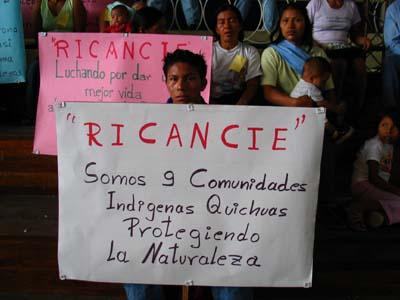Anti-Petroleum Assembly in Tena, Ecuador
Kallari Association - 17.07.2004 00:57
Approximately 2,000 people attended an anti-petroleum assembly in the town of Tena, Ecuador on March 20, 2004. The day marked a new step in the fight against oil exploitation. Participants arrived from the provinces of Napo, Pastaza and Orellana in order to protest oil exploitation in the newly-opened Amazonian oil blocks 20 and 29.

“RICANCIE: We are nine indigenous Kichwa communities protecting nature.”

Demonstrators march peacefully across the main footbridge in the town of Tena.
Approximately 2,000 people attended an anti-petroleum assembly in the town of Tena, Ecuador on March 20, 2004. The day marked a new step in the fight against oil exploitation. The events of the day included various speeches by community leaders and experts in their field, followed by a peaceful march. Participants arrived from the provinces of Napo, Pastaza and Orellana in order to protest oil exploitation in the newly-opened Amazonian oil blocks 20 and 29.
The assembly was organized by a recently-formed coalition comprised of the following local indigenous and social organizations: RICANCIE (Network of Indigenous Communities of the Upper Napo region for Intercultural Living and Ecotourism), Kallari Association, RECOKA (Network of Kichwa Communities of the Amazon), Rukullacta Cooperative, ACIA (Association of Indigenous Communities from Arajuno), Association Tuna Runa Miray, UNE (National Union of Educators) of Napo, Association Waysayacu, Municipality of the County of Loreto, Federation of the Neighborhoods of Tena, Parish of Cotundo, and the Youth Association of Archidona. Together, they have united more than 60 rural Kichwa communities working in ecotourism and production with the urban sector, artisans, youth, educators, cooperatives, and other social organizations in the fight against oil exploitation.
As the first buses arrived in Tena, La Federación Deportiva de Napo Assembly Hall filled with members from the nearby communities. Twenty-nine buses were contracted in order to facilitate the participation of people from the suburbs and surrounding villages of Tena. At 10:30 AM, the moderator welcomed the participants and opened the assembly.
The invited speakers included members of organizations involved in the resistance of oil exploitation, both on local and national levels. Among others, Dr. Patricio Benalcazar from INREDH (Regional Foundation for Human Rights Advocacy) explained the laws and the legal rights of the communities and Dr. José Serrano of CDES (Center for Economic and Social Rights) argued against the legality of the pre-bidding consultation process conducted in the region in 2003. The president of the community of Sarayaku, which is located in the southern Ecuadorian Amazon, spoke of the community’s ability to keep oil companies off their territory for more than ten years through strength and resistance. This speech elicited the audience to rise and loudly applaud in support. The Vice-President of the CONAIE (Confederation of Indigenous Nationalities of Ecuador) was also a featured speaker in the assembly. He promised that he would critically monitor attempts at oil exploitation in the Amazon and reject all oil activities that might threaten the constitutional rights of the people. Following the presentations of the guest speakers, representatives from more than twenty local organizations present affirmed their commitment to resist the entry of oil activity in the zone.
The assembly also elected the first board for the recently-formed coalition Frente de Resistencia a la Actividad Petrolera de los Bloques 20 y 29, which joined the organizations that were present. The coalition was initiated by local people, which was made clear by their overwhelming attendance at the assembly. The members of the Frente de Resistencia will work to resist the entry of oil activity in the zone and protect the environment from the contamination caused by the oil industry. The assembly elected Bartolo Shiguango from the Rukullacta Cooperative as general coordinator, as well as one sub-coordinator for each of the three affected provinces.
The coalition denounced the false statements made by the Ecuadorian government regarding the validity of the pre-bidding consultation process and the resulting attempts at opening the two oil blocks for international bids. Those present demanded that their constitutional rights be respected, particularly the right to be consulted before the entry of the oil industry in occupied territory. They claimed that the recognition of this right by the Ecuadorian government would allow them to live in harmony with the environment and manage it in a sustainable way for the coming generations.
The coalition concluded that the region has been exploited for more than thirty years by foreign oil companies with no resulting benefit to the local population. Rather, the oil exploitation has destroyed the forest, which was their primary source of food. This left them destitute due to Ecuador’s lack of welfare policies. The Frente de Resistencia wants to work actively for a more just and democratic society and find their own alternatives for a sustainable future. They also took a strong stand against all forms of social Darwinism that attempt to excuse injustices committed in the name of development.
The resolutions approved by the assembly obligate all participating communities and organizations to do the following: reject all forms of exploitation on their territory; work so each county achieves protected status because of their unique biodiversity, spiritual value, and cultural heritage; use all possible legal means to annul the pre-bidding consultation process; and declare themselves in a permanent state of defense of their constitutional rights.
At approximately 2:30 PM, the assembly concluded and the demonstration began. The newly-established coalition began to walk the streets of Tena. The crowd marched past the Texaco station and protested the governmental policies and injustices that were committed during the pre-bidding consultation process. The demonstrators declared themselves to be in a state of permanent resistance.
Press release
KALLARI, Tena
April 4, 2004
 Website: http://www.kallari.com Website: http://www.kallari.com
|


